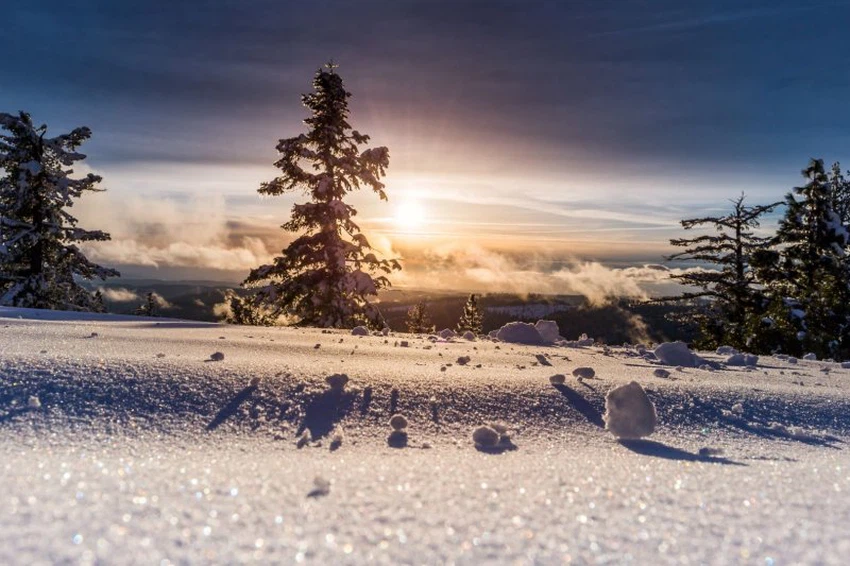Due to the warming of the planet, snow has become rare... What effect does this have on people?
Arabia Weather - Large areas in the United States of America were exposed to strong storms, including blizzards that covered some of the Midwest and Northeast of the country with snow. However, unexpected developments are emerging, as many states that used to enjoy white winters are witnessing an increase in precipitation. Instead of snow right now.
In a related context, a recent study published in the journal Nature reported that the human-caused climate crisis has led to a reduction in snow density in most regions of the Northern Hemisphere over the past forty years, as this shift poses a threat to vital water resources for millions of people.
The impact of climate change on snowfall
The relationship between snow and climate change is complex, and scientists have been challenged to find a clear link between the two phenomena for many years.
Part of these complications is due to the difficulty of measuring snowfall accurately, as scientific data derived from Earth observation, satellites, and climate models have shown conflicting signals about the impact of climate change on snow amounts, although some regions have witnessed an increase in snow amounts in parts of the world that are characterized by their climate. warm, but a recent study conducted by researchers at Dartmouth College provides a comprehensive overview.
The study showed that climate change has led to a significant reduction in snowfall in the global north since the 1980s. Areas in the southwestern and northeastern United States, as well as regions of central and eastern Europe, have seen the largest declines related to global warming, at rates ranging between 10% and 20% per decade.
In this context, Alexander Gottlieb, the study’s lead researcher and doctoral student at Dartmouth College, said:
“It clearly shows that climate change has had negative impacts on snow and related water resources, and every degree of global warming will lead to greater depletion of your snow water resources.”
Declining snow density... warning about the effects of water supply shortages
Scarcity of snow causes water supply shortages, and research has revealed that snow loss accelerates when average winter temperatures rise above minus 8 degrees Celsius (about 17 degrees Fahrenheit), a point called the “snow loss slope.”
This decline reflects negatively on communities that depend on snow to obtain water, as many of the world’s water supplies face serious threats due to climate change, with the increasing frequency and intensity of drought and heat waves and with global temperatures continuing to rise. The study indicates that densely populated areas Highlands that depend on snow may suffer from water shortages in the coming decades.
Justin Mankin, the study's lead researcher and an assistant professor of geography at Dartmouth, explained that the system's shift from snow to precipitation is like having tanks that are half full, or less. He added:
“So the question becomes: ‘Are we going to have a wet spring?’” she said, referring to the challenge that needs to be addressed to offset water withdrawals from areas downstream.
The researchers also analyzed the river basin to measure declining snow water supplies. The study revealed a decline in snowpack in 82 out of 169 major river basins in the Northern Hemisphere, including the Colorado River in the United States and the Danube River in Europe. Mankin confirmed that most of the population The world lives in regions where snow loss is accelerating, where every degree of global warming means greater snow loss.

Water shortages and worsening forest fires threaten large parts of the Northern Hemisphere
As snow declines in the western United States, Justin Mankin offers a look ahead to winters and springs in the Northern Hemisphere. And that change is accelerating, leading to unprecedented water supply shortages and worsening wildfires. Research also shows that snow plays a vital role in preventing fires or... Reducing their intensity, as melting snow provides a slow release of water, which reduces the possibility of fires starting.
As the decrease in snow density also affects winter recreational activities, communities that depend on snow and ski resorts face challenges, and warnings that temperatures are approaching a point that makes even machine-made snow unviable.
Mona Hemmati, a researcher at Columbia University, points out that the research provides compelling evidence about the impact of human climate change on snow patterns. She stresses that this study is a reminder of the importance of addressing climate change through immediate action and international cooperation.
Read also:
Climate change and environmental degradation exacerbate the phenomenon of climate refugees
Sources:
Arabia Weather App
Download the app to receive weather notifications and more..



